A Brief History of Form in Literature
DOI:
https://doi.org/10.13135/2281-6658/636Keywords:
Literary criticism, Form, New CriticismAbstract
This essay will try to go back over the complex history of the concept of form, although its subject may often turn out to be unthinkable or unspeakable. In literary critcism the formalist approach is based on a double trend: on the one hand a widespread mistrust in the power of language to communicate and to represent reality, on the other, the beginnings of a formalist approach in art history, - in Burkhardt, Wörringer, Wölfflin - leading to an art history ‘without names’ and giving rise in turn to a formalist approach in literary criticism. There are close connections between The New Critics of the thirties and fifties in the United States and in England and the French Nouvelle Critique, both of which ended up reinforcing the tenets of the various modernist avant-gardes: impersonality, the autonomy of the work of art and the literary specificity of a literary text. While underlining the ambiguities emerging from the original term – form covers both the sense of eidos-idea and hule-matter, the essay ends up acknowledging the current demise of formalist criticism.Downloads
Downloads
Published
Issue
Section
License
Authors keep the copyrights for their work and give the journal the work’s first publication copyright, which is at the same time licensed under a Creative Commons License – Attribution, which in turn allows other parties to share the work with an acknowledgement of the work's authorship and initial publication in this journal.
Content Licence

You are free to copy, distribute and transmit the work, and to adapt the work. You must attribute the work in the manner specified by the author or licensor (but not in any way that suggests that they endorse you or your use of the work).
Metadata licence

CoSMo published articles metadata are dedicated to the public domain by waiving all publisher's rights to the work worldwide under copyright law, including all related and neighboring rights, to the extent allowed by law.
You can copy, modify, distribute and perform the work, even for commercial purposes, all without asking permission.





